Refine search
Actions for selected content:
223981 results for David Crystal English Language
David Crystal, Evolving English: One language, many voices. London: The British Library, 2010. Pp. 159.
-
- Journal:
- English Language & Linguistics / Volume 16 / Issue 3 / November 2012
- Published online by Cambridge University Press:
- 22 October 2012, pp. 531-535
-
- Article
- Export citation
David Crystal, The Cambridge encyclopedia of the English language. Cambridge: Cambridge University Press, 1995. Pp. vii+489.
-
- Journal:
- Journal of Linguistics / Volume 33 / Issue 1 / March 1997
- Published online by Cambridge University Press:
- 01 March 1997, pp. 171-212
- Print publication:
- March 1997
-
- Article
- Export citation
David Crystal, Begat: The King James Bible and the English Language (Oxford: Oxford University Press, 2010), pp. 327. £14.99 (hbk).
-
- Journal:
- Scottish Journal of Theology / Volume 66 / Issue 4 / November 2013
- Published online by Cambridge University Press:
- 11 October 2013, pp. 496-497
- Print publication:
- November 2013
-
- Article
- Export citation
David Crystal. The Cambridge Encyclopedia of the English Language. Cambridge: Cambridge University Press, 1995. Pp. vii + 489. US$49.95 (hardcover).
-
- Journal:
- Canadian Journal of Linguistics/Revue canadienne de linguistique / Volume 41 / Issue 4 / December 1996
- Published online by Cambridge University Press:
- 27 June 2016, pp. 393-396
-
- Article
- Export citation
David Crystal, English as a global language. Cambridge & New York: Cambridge University Press, 1997. Pp. x, 150. Hb $9.95.
-
- Journal:
- Language in Society / Volume 28 / Issue 1 / January 1999
- Published online by Cambridge University Press:
- 01 January 1999, pp. 120-124
- Print publication:
- January 1999
-
- Article
- Export citation
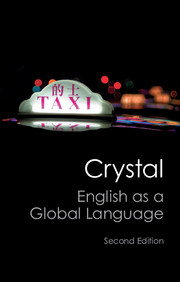
English as a Global Language
-
- Published online:
- 05 February 2014
- Print publication:
- 29 March 2012
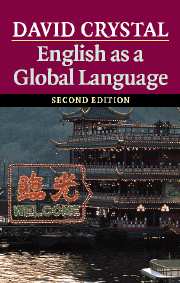
English as a Global Language
-
- Published online:
- 22 September 2009
- Print publication:
- 21 July 2003
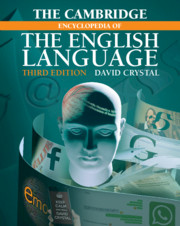
The Cambridge Encyclopedia of the English Language
-
- Published online:
- 24 November 2018
- Print publication:
- 29 November 2018
-
- Textbook
- Export citation
Crystallised English
-
- Journal:
- English Today / Volume 11 / Issue 4 / October 1995
- Published online by Cambridge University Press:
- 17 October 2008, p. 57
- Print publication:
- October 1995
-
- Article
-
- You have access
- Export citation
2 - Language developments in British English
-
-
- Book:
- The Cambridge Companion to Modern British Culture
- Published online:
- 28 September 2010
- Print publication:
- 19 August 2010, pp 26-41
-
- Chapter
- Export citation
David Crystal. The Cambridge Encyclopedia of the English Language. Cambridge: Cambridge University Press, 1995. Pp. 489 Hb. US$49.95. ISBN 0-521-40179-8.
-
- Journal:
- Journal of the International Phonetic Association / Volume 24 / Issue 2 / December 1994
- Published online by Cambridge University Press:
- 06 February 2009, pp. 99-101
-
- Article
- Export citation
Richard Hogg and David Denison (eds.), A history of the English language
-
- Journal:
- Language in Society / Volume 37 / Issue 1 / February 2008
- Published online by Cambridge University Press:
- 15 January 2008, p. 156
- Print publication:
- February 2008
-
- Article
- Export citation
David Crystal, Language death. Cambridge: Cambridge University Press, 2000. Pp. x+198.
-
- Journal:
- Journal of Linguistics / Volume 38 / Issue 2 / July 2002
- Published online by Cambridge University Press:
- 02 October 2002, pp. 441-462
- Print publication:
- July 2002
-
- Article
- Export citation
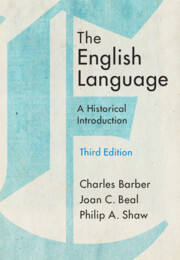
The English Language
- A Historical Introduction
- Coming soon
-
- Expected online publication date:
- November 2025
- Print publication:
- 31 October 2025
-
- Textbook
- Export citation
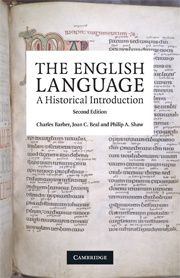
The English Language
- A Historical Introduction
-
- Published online:
- 05 June 2012
- Print publication:
- 26 March 2009
-
- Book
- Export citation
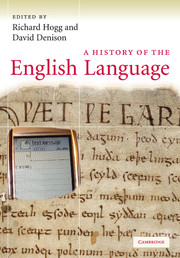
A History of the English Language
-
- Published online:
- 05 September 2012
- Print publication:
- 20 April 2006
Language death. David Crystal. Cambridge: Cambridge University Press, 2000. Pp. 208.
-
- Journal:
- Applied Psycholinguistics / Volume 22 / Issue 2 / June 2001
- Published online by Cambridge University Press:
- 25 September 2001, pp. 269-273
-
- Article
- Export citation
Linguistics, Language and Religion by David Crystal. Burns and Oates (Faith and Fact, 9s 6d).
-
- Journal:
- New Blackfriars / Volume 46 / Issue 542 / August 1965
- Published online by Cambridge University Press:
- 01 July 2024, pp. 656-657
- Print publication:
- August 1965
-
- Article
- Export citation
English as a Second Language and English as a Foreign Language
-
- Journal:
- PMLA / Publications of the Modern Language Association of America / Volume 78 / Issue 2 / May 1963
- Published online by Cambridge University Press:
- 07 January 2021, pp. 25-28
- Print publication:
- May 1963
-
- Article
- Export citation
9 - English or Englishes? The Politics of Language and the Language of Politics
-
- Book:
- The Power of African Cultures
- Published by:
- Boydell & Brewer
- Published online:
- 17 March 2023
- Print publication:
- 15 September 2003, pp 224-249
-
- Chapter
- Export citation
